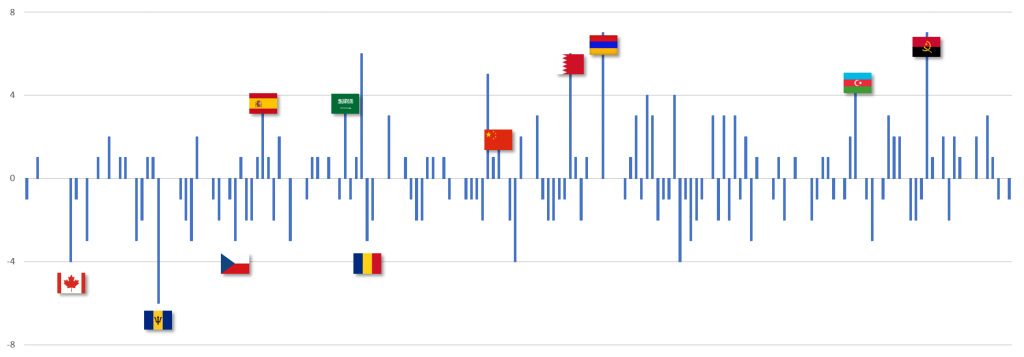Corruption Perceptions Index 2019 published
On January 23, 2020, Transparency International published the updated Corruption Perceptions Index (“CPI“) for 2019.
Summary
- The CPI 2019 shows a worldwide increase in perceived corruption. As in the previous year, two-thirds of the countries surveyed achieved a score of less than half of the attainable point value (100), thus showing a critical level of corruption. At 43 points, the global point average is also at the same level as last year.
- Germany achieved a score of 80 points (the same as last year) but improved by two places to 9th place in the ranking.
- The USA, which slipped by four points to 71 points in the CPI 2018, deteriorated its rating further to 69 points and slipped to 23rd place.
Overview Corruption Perceptions Index 2019
The international anti-corruption organization Transparency International published the updated CPI for 2019 on January 23, 2020. This index summarizes the results of 13 surveys, expert evaluations and investigations to measure the perceived level of corruption in the public sector. The CPI evaluates the level of perceived corruption in 180 countries considering the economic, political and administrative spheres. The CPI’s scale ranges from zero points (“high level of perceived corruption”) to 100 points (“perceived high level of integrity”).
The CPI 2019 shows a worldwide increase in perceived corruption over the past year. More than two thirds of the countries surveyed scored less than 50 points. As in the previous year, the global average is only 43 points.

In publishing the CPI 2019, Transparency International explicitly refers to the increasingly important anti-corruption movements worldwide and calls for greater political integrity in countries that are noticeably affected by corruption. Transparency International further argues that this development is fostering a progressive loss of confidence in governments, political leaders, elected officials and even democracy itself. To counteract this development, governments should strengthen the separation of powers, reduce the influence of money on politics and promote public participation in political decision-making.
Development of the perception of corruption
Overall, the level of perceived corruption in the public sector is the least perceived as a problem in Europe, with an average score of 66 points. The situation is much worse in Africa and the Middle East (35 points on average), Eastern Europe and Asia (40 points on average), but also in the USA and Latin America, where the average is only 43 points.
The frontrunners in the CPI 2019 are Denmark and New Zealand with 87 points each and Finland (86 points), while Syria (13 points), Southern Sudan (12 points) and Somalia (9 points) occupy the last places.

One of the biggest loss in points was faced by Barbados losing 6 points compared to last year’s CPI ranking. Surprisingly, one of the biggest drops compared to last year’s results was Canada. Canada’s downrating presumably is based on the case where a representative of SNC Lavalin was convicted of bribery in Libya. Canada also fell back from 9th to 12th place with a current CPI rating of 77 points. The further deterioration of the USA’s CPI rating is also striking. While it had already deteriorated by four points to 71 points last year, the CPI 2019 fell by another 2 points to 69 points Accordingly, the USA are dropping from 22nd to 23rd place. Corruption is thus perceived as a growing problem in both the USA and Canada in business and government institutions.
Developments in Armenia, Angola, Malaysia and Bahrain are viewed positively. These countries increased by either 7 or 6 points respectively compared to the previous year. Armenia thus managed to jump 28 places from 105th place in last year’s ranking to 77th place in the current CPI ranking.
Azerbaijan, which fell 30 places from 122nd to 152nd last year, has also recovered to some extent and climbed from 152nd to 126th place in the CPI ranking.
With 9th place in the ranking, Germany improved its position by two places compared with the previous year. However, Germany was unable to improve its overall score of 80 points. Transparency International sees deems the current practice of party financing in Germany and the current regulations on the bribery of elected officials under Section 108 e of the German Criminal Code as problem areas that stand in the way of a better ranking.
Impact of the Corruption Perceptions Index for companies
The results of the updated CPI must also be taken into account in day-to-day business, as they provide important risk indicators for compliance risk analyses and risk-based business partner reviews, both of which are essential elements of an effective and efficient compliance management system. In particular, business relationships in countries whose score or ranking has deteriorated conspicuously should be critically reviewed, as new or increased compliance risks may have developed here.
To the website of Transparency International.